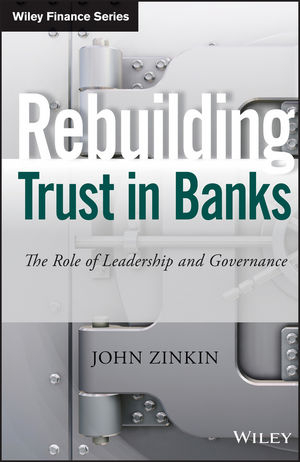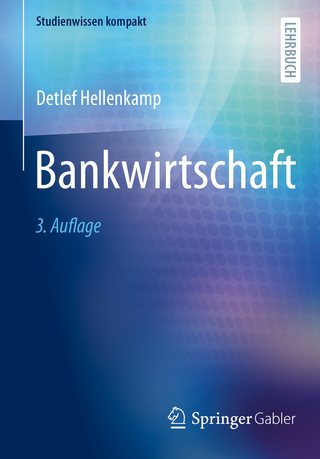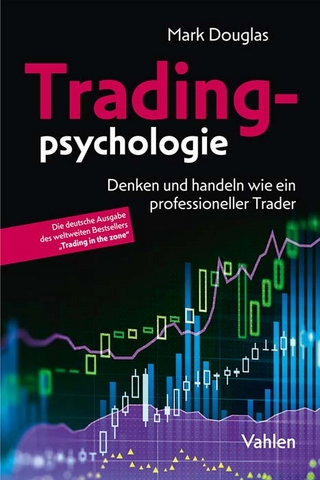
Rebuilding Trust in Banks
John Wiley & Sons Inc (Verlag)
978-1-118-55038-0 (ISBN)
- Titel ist leider vergriffen;
keine Neuauflage - Artikel merken
An outline of the core principles and strategies required to restore the credibility of the global finance industry Since 2008, the global financial industry has lurched from crisis to crisis, calamity to calamity, resulting in an epic loss of public trust in banking and financial institutions. Rebuilding Trust in Banks argues that this series of disasters have usually been the result failures of leadership and governance, combined with unenforced systems of checks and balances. Often, leaders lose their way, believing their own hype and buying into their own propaganda. The more successful these leaders are initially the greater their self-confidence grows along with the certainty that they re right. The result is a dangerous hubris with no countervailing power to stop or change reckless, unethical, or self-interested strategies. This book offers a solution, with useful benchmarks for corporate governance and a global perspective.
* Features effective best practices for ensuring good corporate governance and responsible leadership in banking and finance * Written by a renowned expert in corporate governance with more than 40 years of experience, particularly in Asia * Intended for corporate leaders and board members in financial companies, as well as regulators, advisors, and students If banks and other financial institutions truly want to rebuild the trust they once enjoyed, this practical and prescriptive guide offers effective best practices that can and should be widely implemented throughout the industry.
JOHN ZINKIN is Managing Director of Zinkin Ettinger Sdn Bhd and a faculty member of the Iclif Leadership and Governance Centre, Malaysia, specializing in training boards in ethics and governance. John previously served as managing director of corporate governance at the Iclif Leadership and Governance Centre, Malaysia. Prior to that, he was CEO of the Securities Industry Development Corporation (SIDC) the training and development arm of the Malaysian Securities Commission, where he was responsible for taking the company from its incorporation to financial self-sufficiency. John has more than forty years' experience in business, twenty-eight of which have been in Asia, where he held senior line management and corporate strategy/business development positions in major multinational manufacturing, marketing, and consulting companies. In 2013, John was awarded the Panglima Makhota Wilayah (PMW) by the federal government of Malaysia, which carries the title of Datuk for services to the nation. John attended the London Business School where he received an MSc in Business Administration, and Oxford where he received a BA in Politics, Philosophy and Economics.
Preface xi Acknowledgments xix Chapter 1 Leadership: A Force for Change 1 Napoleon Leadership Lessons 13 Conclusion 17 Notes 17 Chapter 2 Leadership: From Success to Failure 25 Stan O Neal 28 Jimmy Cayne 30 Dick Fuld 33 Fred Goodwin 37 Conclusion 42 Notes 43 Chapter 3 Setting the Tone at the Top 47 Conclusion 60 Appendix 3A Board Questions Regarding the Tone at the Top 63 Notes 68 Chapter 4 Ethics in Finance 71 Systemic Integrity 72 Market Integrity 75 Regulatory Integrity 78 Organizational Integrity 81 Personal Integrity 81 Four Ethical Lenses 90 Conclusion 93 Notes 94 Chapter 5 The Role of the Board: Theory and Reality 97 Blurring of the Boundaries 99 Role of the Chair 113 Role of the CEO 116 Role of Committees 117 Why Boards Failed 117 Conclusion 121 Appendix 5A The Role of Board Committees 123 Notes 126 Chapter 6 Leadership, Governance, Strategy, and Risk 131 Choice of Strategy 133 Avoiding Cultural Risk 144 Failure of Effective Implementation 146 Questions Regarding Risk 148 Conclusion 154 Appendix 6A Board Questions Regarding Strategy 156 Appendix 6B Board Questions Regarding Risk 165 Notes 170 Chapter 7 Developing Suitable Leaders 175 Succession Planning 175 Talent Management 186 The Impact of Remuneration and Reward on the Suitability of Leaders 193 Conclusion 194 Appendix 7A Board Questions to Ensure Suitable People 197 Notes 203 Chapter 8 Ensuring Organizational Integrity 205 Creating a Compatible Culture 205 Problems of Compliance 209 Instituting Appropriate Controls 215 Conclusion 223 Appendix 8A Creating a Suitable ERM Framework 226 Notes 241 Chapter 9 Governance: The Wise Restraints That Set Men Free 245 Why Corporate Governance Matters 245 Three Components of Good Governance 251 Overlaps, Underlaps, and Turf Wars 260 Regulatory Arbitrage Based on Different Philosophies of Regulation 261 Inadequate Sanctions and Penalties 262 The Way Forward 263 Conclusion 264 Notes 265 Chapter 10 Leadership with Governance: Rebuilding Trust in Banks 271 Leadership Alone Is Not Enough 271 Governance Failed 272 What Is Needed to Rebuild Trust 276 Conclusion 286 Notes 290 About the Author 295 Index 297
| Erscheint lt. Verlag | 24.1.2014 |
|---|---|
| Reihe/Serie | Wiley Finance Editions |
| Verlagsort | New York |
| Sprache | englisch |
| Maße | 159 x 233 mm |
| Gewicht | 652 g |
| Themenwelt | Wirtschaft ► Betriebswirtschaft / Management ► Finanzierung |
| Betriebswirtschaft / Management ► Spezielle Betriebswirtschaftslehre ► Bankbetriebslehre | |
| Wirtschaft ► Betriebswirtschaft / Management ► Unternehmensführung / Management | |
| ISBN-10 | 1-118-55038-2 / 1118550382 |
| ISBN-13 | 978-1-118-55038-0 / 9781118550380 |
| Zustand | Neuware |
| Haben Sie eine Frage zum Produkt? |
aus dem Bereich


